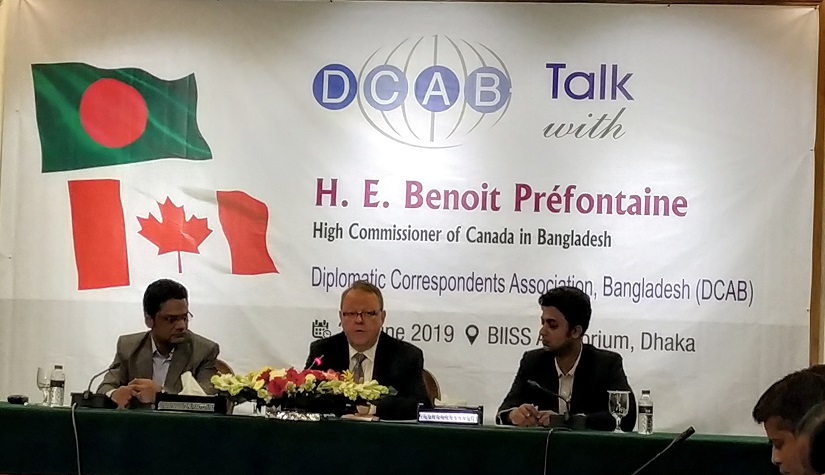
Canada to help traumatized Rohingya women
- ২৭ জুন ২০১৯, ০৮:৫৯

Canada is working on priority basis to ensure safe living condition and psychological soundness of tens of thousands traumatized Rohingya women and girls who fled violence in Myanmar to Bangladesh.
“This gender-responsive approach has helped provide vital resources to [Rohingya] women and girls who have experienced sexual and gender-based violence, and has provided access to safe spaces, psychological support for survivors and services specific to their needs”, High Commissioner of Canada in Bangladesh Benoit Prefontaine told on Wednesday while talking with Dhaka-based diplomatic correspondents.
Peaceful environment in the refugee camps in southern Cox’s Bazar with almost 1.2M Rohingya also depends on how peacefully the women and girls are living there, the envoy observed.
He added: “Canada’s programming takes the different needs of women and girls into consideration and supports programming that responds to their unique vulnerabilities, priorities and capabilities, while also promoting agency and empowerment for women and girls.”
According to Amnesty International, more than 750,000 Rohingya refugees, mostly women and children, have fled Myanmar and crossed into Bangladesh after Myanmar forces launched a crackdown on the minority Muslim community in August 2017.
Since Aug. 25, 2017, nearly 24,000 Rohingya Muslims have been killed by Myanmar’s state forces, according to a report by the Ontario International Development Agency (OIDA).
More than 34,000 Rohingya were also thrown into fires, while over 114,000 others were beaten, said the report, titled "Forced Migration of Rohingya: The Untold Experience".
Some 18,000 Rohingya women and girls were raped by Myanmar’s army and police and over 115,000 Rohingya homes were burned down and 113,000 others vandalized, it added.
The UN has also documented mass gang rapes, killings – including of infants and young children – and brutal beatings and disappearances committed by Myanmar state forces.
In a report, UN investigators said such violations may have constituted crimes against humanity and genocidal intent.
Emphasizing on health, nutrition and basic education services for Rohingya refugees in Cox’s Bazar Prefontaine said: “The crisis is not just about sheltering Rohingya. We place crucial importance on addressing the urgent needs of crisis-affected populations in Cox’s Bazar, both refugees and those living in the affected host communities”.
Recognizing that the solution to the crisis lies in Myanmar, Canada’s contributions also address the needs of crisis-affected populations in Myanmar, he added.
Mentioning to $86.8M contribution of Canada in last three years the envoy said that it has helped improve living conditions of the Rohingya in the camps and support the host community in Bangladesh to help mitigate the impact of the crisis.
He also talked about the law and order situation in Bangladesh. “We remain concerned about a lack of democratic space in the country, enforced disappearances, and workers’ rights”.